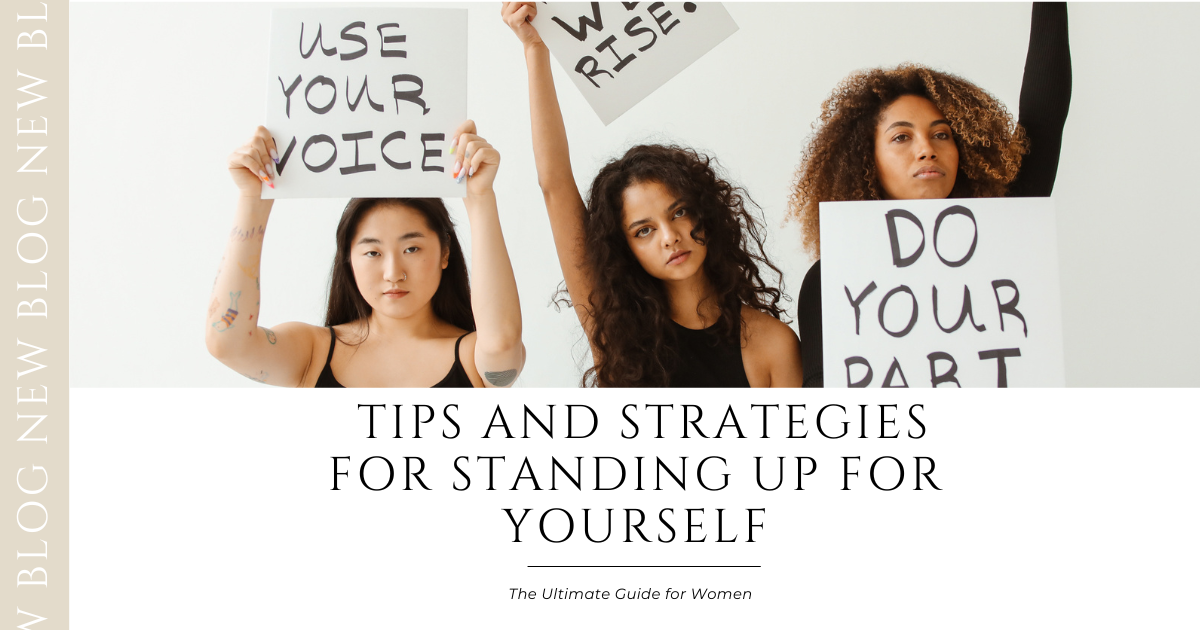Find Your Voice: Mastering the Art of Speaking Up in Any Situation

Every day, we face situations where we must stand up for ourselves. This could be a waiter messing up our order, someone cutting us off in line, or a coworker taking credit for our work. There are many chances for us to show we won’t back down. But, not everyone finds it easy to speak up and defend their rights.
This guide will give you strong strategies to help women speak up, communicate clearly, and stand firm in any situation. It’s all about finding your voice and making sure it’s heard.

Key Takeaways
- Discover how to find your authentic voice and communicate with confidence
- Learn effective techniques to set healthy boundaries and avoid resentment
- Overcome the fear of conflict and resistance to self-advocacy
- Master the art of assertive communication, including body language and tone
- Apply strategies for standing your ground in the workplace and personal relationships
Why Standing Up for Yourself Matters
Learning to stand up for yourself is key for your mental health. If you don’t speak up, you might feel you’re letting yourself down. This can make you feel resentful and lower your self-worth. But, speaking up can boost your self-confidence and help you set healthy boundaries. This stops you from always trying to please others.
Boosting Self-Confidence and Assertiveness
Assertiveness is a skill you can get better at. This guide will give you tips to help you speak up for your needs. A survey of 1,100 female employees showed that 45% found it hard to speak up at work. This shows how hard it can be for women in the workplace because of gender expectations.
Setting Healthy Boundaries and Avoiding Resentment
Boundaries and values are key to deciding when to speak up. When people feel their values are being ignored, they might become more assertive. Having a good workplace culture and following rules helps keep everyone safe and included. If someone breaks the rules, it’s important to speak up to stop things from getting worse.
“Employees spend on average more than two weeks ruminating about missed opportunities to speak up, costing organizations approximately $7,500 per conversation.”
When someone has more power, like in leadership roles, they should use their voice for those who can’t speak up. It’s important to be kind when speaking up to help solve conflicts and keep good relationships at work.
Overcoming Roadblocks to Self-Advocacy
Many people find it hard to speak up for themselves because of their past. If you grew up in a strict home where speaking out was punished, or if your needs were ignored, you might think your voice doesn’t count. Also, the fear of conflict or thinking others won’t accept you can stop you from being assertive.
Childhood Experiences and Learned Behaviors
Our early life shapes our self-esteem and how we speak up. People with disabilities from the 80s and 90s were often told not to question, share their thoughts, or stand up for themselves. This makes self-advocacy hard for them. But, moving to person-directed supports can help them find their voice. This leads to more confidence in sharing their true thoughts.
Fear of Conflict and Resistance
Learning to advocate for yourself can make you anxious, but this can be lessened by practicing, connecting with others, and knowing your voice is important. Self-advocacy is key to independence, letting people make choices about their lives. It’s important to support self-advocacy in people with disabilities to make sure their voices are heard in discussions about diversity and inclusion.
To overcome these deep beliefs and behaviors, you need to reflect on yourself and be open to change. This guide will help you spot and tackle the issues that stop you from speaking up for yourself. It will empower you to find your voice and become a confident self-advocate.
Finding Your Voice & Speaking Up
Finding your true voice and expressing it can seem scary at first. But with effort and willpower, you can beat the fear and doubt that stops you. This part will give you tips on becoming more aware of yourself, improving how you communicate, and helping you speak up when it matters. By using your voice, you’ll feel more in control of your life and better able to stand up for what you need.
A recent study found that many people stay quiet when they see wrong behavior or disagree with others. The fear of speaking out isn’t just about arguing or disagreeing. It’s also the fear of being left out by others. This makes people often choose to go along with the group, even if they don’t agree.
To fight this, we need to value and respect different views. Using “I” statements instead of “you” statements helps avoid blaming others. Asking questions instead of making accusations can also help keep the conversation open.
Creating an “if-then” plan can help you prepare to speak up when it’s needed. Having a plan can make you less anxious and more likely to act when it counts. Remember, finding your voice and speaking up are skills you can get better at with practice. They’re key for self-expression, empowerment, and effective communication.
| Engagement Levels | Percentage |
|---|---|
| Struggling with participation | 20% |
| Occasional participant, tends to listen first | 30% |
| Comfortable but lacks confidence in message delivery | 25% |
| Confident in participation but needs to improve clarity and persuasion | 25% |
Knowing how people usually engage helps us make better strategies to help them find their voice and speak up confidently. These insights help us create a space that encourages self-expression and empowerment.

“The most common way people give up their power is by thinking they don’t have any.” – Alice Walker
This quote tells us that we all have the power to speak up and stand for ourselves. By embracing our voices and overcoming what holds us back, we can unlock our true communication potential. We become advocates for our own needs and beliefs.
Mastering the Art of Assertive Communication
Being able to communicate well is key to speaking up for yourself. Learning assertive communication helps you share your thoughts and needs clearly and with confidence. It also keeps conversations respectful.
“I” Statements and Respectful Dialogue
“I” statements are a strong tool in assertive communication. They focus on your own feelings and thoughts, avoiding blame. This way, you can share your point without accusing others. It helps keep conversations open and respectful, letting you stand firm without hurting relationships.
Body Language and Tone of Voice
Your body language and tone of voice matter a lot. Keeping eye contact, standing up straight, and speaking calmly shows confidence. These actions support your assertive communication and make sure your message gets through right.
To be assertive, speak clearly and with confidence, but respect others’ views too. With time, these skills will help you stand up for yourself. You won’t lose your relationships or become aggressive.

“Assertive communication is not about winning or losing; it’s about finding mutually beneficial solutions.”
| Assertive Communication | Aggressive Communication | Passive Communication |
|---|---|---|
| Expresses thoughts and feelings directly and respectfully | Expresses thoughts and feelings in a hostile, belligerent manner | Avoids expressing thoughts and feelings, or does so in a meek or submissive way |
| Stands up for rights while considering the rights of others | Violates the rights of others to stand up for their own rights | Allows their own rights to be violated to avoid conflict |
| Leads to mutual understanding and respect | Leads to hostility and damaged relationships | Leads to resentment and feelings of powerlessness |
Scenarios for Standing Your Ground
Knowing when and how to stand up for yourself is key. This section will show you real-world examples where being assertive is important. You’ll learn how to deal with a demanding boss, defend your ideas, set boundaries with friends, or handle conflicts with family. By practicing self-advocacy, you’ll gain confidence and learn to stand up for yourself.
In the Workplace and Professional Settings
In the workplace and other professional settings, it’s vital to stand your ground. Imagine your boss keeps giving you tasks not in your job description, asking you to work extra without pay. Instead of just accepting it, use assertive communication to talk about it. Explain your current tasks, your contributions, and suggest a fair solution that fits your job and pay.
Another common issue is when your ideas are ignored in meetings. Don’t stay quiet. Speak up and share your thoughts using “I” statements. Be ready to back up your ideas with evidence. Stay calm and open to finding a solution everyone can agree on.
In Personal Relationships and Social Circles
It’s also crucial to stand your ground in personal relationships and social circles. If a friend always cancels plans or doesn’t keep promises, talk to them about your feelings and expectations. Set clear boundaries to show what you need to feel respected.
Dealing with a family member who criticizes your choices can be tough. It’s important to stand up for your right to make your own decisions. Be clear and firm in sharing your views, and take steps to protect yourself if the criticism is too much.
“The greatest weapon against stress is our ability to choose one thought over another.” – William James
Standing your ground doesn’t mean being aggressive. It’s about being clear, empathetic, and respectful when sharing your needs and boundaries. This skill helps protect your self-worth and builds better relationships in both your professional and personal life.
Conclusion
This guide has given you the tools to be more confident and self-aware. You now know how important it is to stand up for yourself. This can help you overcome obstacles and improve how you communicate.
Your voice is powerful, and using it respectfully can help you set boundaries. This leads to more respect in your life.
The key takeaways include boosting self-confidence and setting boundaries. Overcoming fear of conflict is also crucial. By applying these ideas, you can speak up in all areas of life. This leads to more fulfillment and respect for yourself.
Self-advocacy is a journey that keeps going. Look for resources and support to help you. Be around people who value your voice and support you. Together, we can make a better society, one empowered voice at a time.



